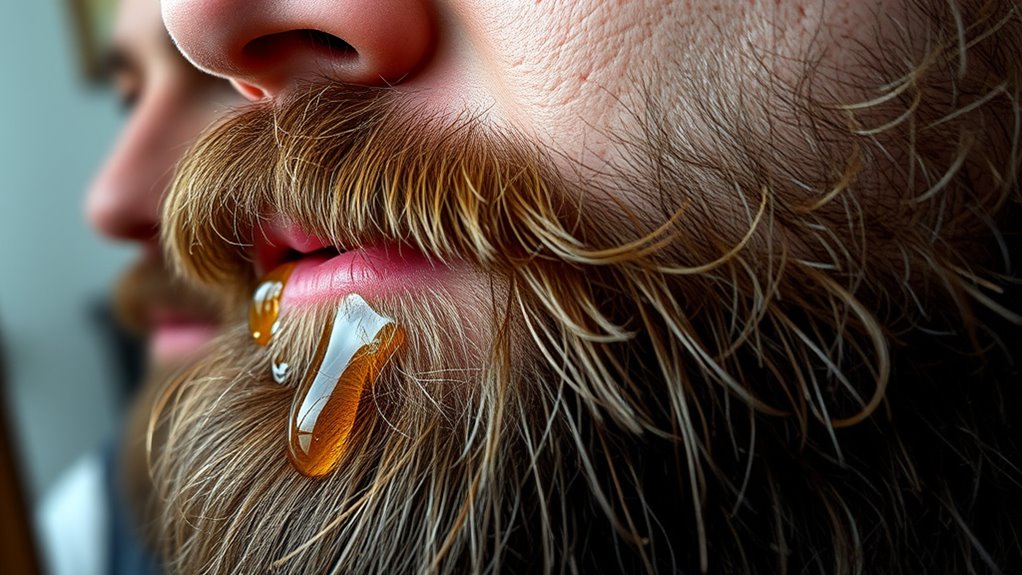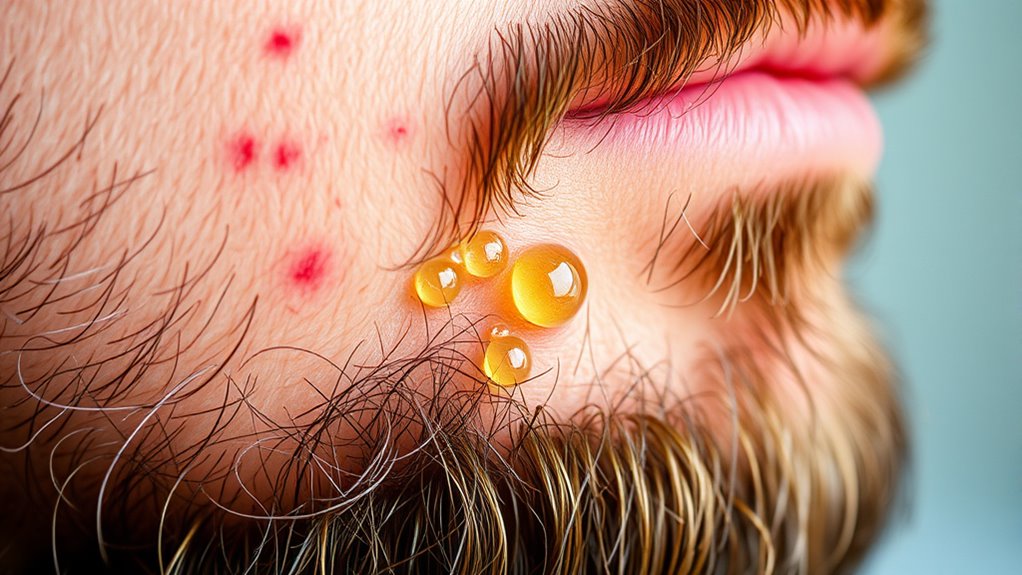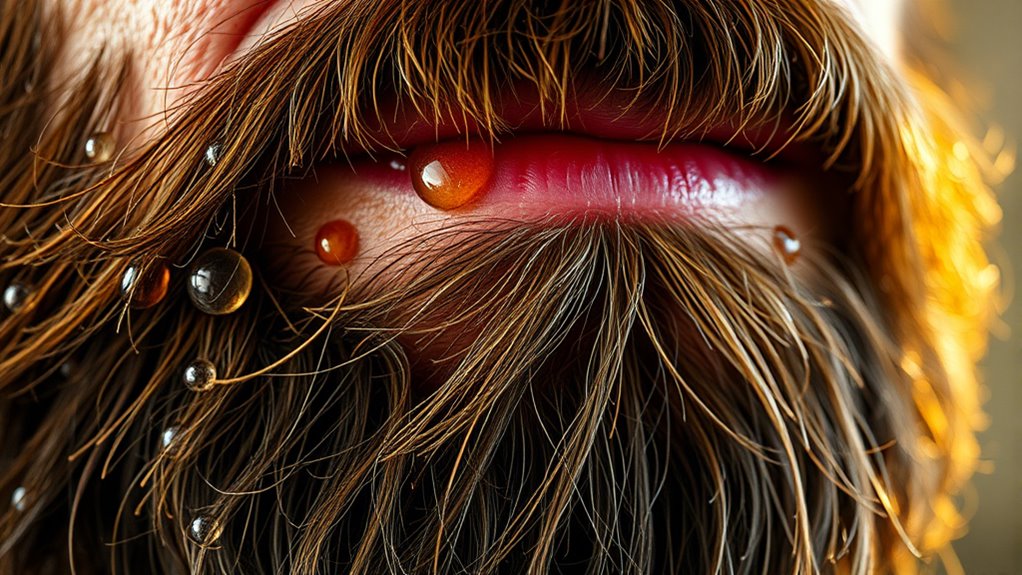Many beard oils contain hidden irritants and comedogenic ingredients like coconut, almond, and soybean oils that clog pores and cause breakouts. Fragrances, dyes, and alcohol-based ingredients can trigger redness and irritation, especially for sensitive skin. Coconut oil’s thick, occlusive nature further worsens skin issues by trapping bacteria. To protect your skin, identify safer alternatives and proper application techniques—you’ll discover more ways to keep your skin healthy below.
Key Takeaways
- Many beard oils contain comedogenic ingredients like coconut and almond oils that clog pores and cause breakouts.
- Synthetic fragrances and preservatives in beard products can trigger allergic reactions and skin irritation.
- Coconut oil’s occlusive nature traps bacteria and dirt, increasing the risk of skin congestion and irritation.
- Natural alternatives like jojoba and argan oils are safer for sensitive skin and help prevent clogged pores.
- Proper product selection, ingredient checking, and patch testing are essential to avoid adverse skin reactions from beard oils.
Hidden Comedogenic Ingredients in Beard Oils That Clog Pores

Many beard oils contain hidden comedogenic ingredients that can clog your pores without you realizing it. Ingredients like coconut oil, almond oil, soybean oil, and safflower oil are common in beard products but have high comedogenic ratings, meaning they can cause pore clogging. When these oils block hair follicles, they trap dirt and bacteria, increasing the risk of skin irritation and acne breakouts. Even natural oils labeled as “healthy” or “moisturizing” can be problematic if they have comedogenic properties. If you have sensitive or acne-prone skin, these ingredients may lead to unwanted skin issues. To avoid pore congestion and skin irritation, look for beard oils with non-comedogenic oils like jojoba or argan oil, which are safer for your skin.
The Risks of Essential Oils and Fragrance Additives for Sensitive Skin

While avoiding comedogenic oils can help prevent clogged pores, sensitive skin faces additional risks from ingredients like essential oils and fragrance additives commonly found in beard products. Essential oils, while natural, can cause irritation, redness, itching, and burning, especially if your skin is sensitive. Some essential oils may also trigger allergic reactions or rashes when exposed to sunlight, increasing your skin’s sensitivity. Essential oils can also disrupt the skin’s barrier, leading to dermatitis or contact allergies, particularly when used in high concentrations or combined with other irritants. Repeated exposure to these irritating ingredients can worsen skin problems and make your skin more reactive over time. To protect sensitive skin, opt for unscented beard oils that eliminate the risk of irritation from fragrance ingredients. Additionally, understanding natural materials used in grooming products can help you choose options that are gentler on your skin. Being aware of skin sensitivities can further guide you in selecting products that minimize adverse reactions and promote healthier skin. Incorporating products with hypoallergenic formulations can also reduce the likelihood of irritation and support your skin’s overall health. Recognizing the benefits of gentle ingredients can help you make informed choices for your skincare routine.
Why Coconut Oil Might Be Making Your Skin Worse

Coconut oil might be making your skin worse because it’s highly comedogenic, meaning it’s prone to clogging pores and causing breakouts. Its thick, occlusive texture forms a barrier that traps dirt and bacteria, leading to skin irritation and acne. Unlike lighter oils, coconut oil doesn’t penetrate deeply, so it often worsens pore congestion instead of moisturizing effectively. Using coconut oil in beard oil can trap bacteria after shaving, increasing irritation. Additionally, the regulations around skin and product safety are essential to consider when choosing skincare ingredients. It’s important to be aware that cosmetic safety standards vary across regions, which can impact the safety of products containing coconut oil. Furthermore, understanding product labeling can help consumers make safer choices when selecting beard oils. Being aware of ingredient safety assessments can also help identify potentially problematic components in skincare products. Recognizing the formulation guidelines used in cosmetic products can help ensure you select options that are less likely to cause skin issues.
Better Conditioning Alternatives for Acne-Prone and Sensitive Skin

If you have acne-prone or sensitive skin, choosing gentle, non-comedogenic oils is key. Look for hydrating plant-based ingredients like jojoba and argan oil that nourish without clogging pores. Avoid products with irritating additives to keep your skin calm and healthy.
Gentle, Non-Comedogenic Oils
For those with acne-prone or sensitive skin, choosing the right beard oil is essential to avoid breakouts and irritation. Look for non-comedogenic oils that won’t clog pores or disrupt your skin’s natural oils. Jojoba oil closely resembles your skin’s sebum, making it a gentle, effective choice that prevents pore blockages. Argan oil provides hydration with its antioxidants and vitamin E without causing breakouts or irritation. Evening primrose oil helps maintain your skin’s barrier and reduces inflammation, ideal for sensitive skin. Tea tree oil offers natural antibacterial benefits, soothing your skin and reducing acne. Opting for pure, high-quality oils like jojoba or Moroccan argan minimizes irritation and supports healthy, well-conditioned skin and beard hair. Additionally, choosing vetted products ensures you’re using safe, high-quality oils that are less likely to cause adverse reactions. Incorporating high-quality carrier oils can further reduce the risk of irritation and enhance skin health. Using oils with appropriate filtration can help remove impurities and contaminants, making your skincare routine safer and more effective. Being aware of skin sensitivities and selecting oils accordingly can significantly improve your beard care routine and overall skin condition. Regularly inspecting your products for contaminants and choosing those with proper storage can also prevent skin issues caused by degraded oils.
Hydrating Plant-Based Ingredients
Are you seeking beard conditioning ingredients that hydrate your skin without causing breakouts or irritation? Hydrating plant-based ingredients like jojoba oil and argan oil are excellent choices. Jojoba oil closely resembles natural sebum, making it non-comedogenic and perfect for sensitive, acne-prone skin. Argan oil is packed with vitamin E and fatty acids, delivering deep moisture while supporting skin nourishment without clogging pores. These plant-based oils provide effective conditioning and hydration without synthetic fragrances or harmful additives. Incorporating HEPA filters into your beard care routine can help minimize airborne irritants and allergens that may contribute to skin issues, further supporting healthier skin. Using naturally derived oils aligns with the understanding that environmental influences can impact skin health and irritation. Additionally, choosing plant-based oils over synthetic alternatives can reduce the risk of sensitization and long-term skin damage. Evening primrose oil, rich in GLA, reduces inflammation and aids skin healing, making it suitable for irritated skin. Incorporating these natural oils into your beard care routine can help you achieve healthier, well-hydrated skin without the risk of breakouts or irritation.
Avoiding Irritating Additives
Avoiding irritating additives is essential when selecting beard conditioning products for sensitive or acne-prone skin. Many beard oils contain irritating additives like artificial fragrances, synthetic dyes, and alcohol-based ingredients that can trigger skin inflammation and allergies. These substances often cause redness, itching, and breakouts, especially for delicate skin. To minimize these risks, choose unscented oils or products with natural, pure ingredients. Natural carrier oils such as jojoba and argan are less likely to clog pores or cause irritation compared to coconut or soybean oils. Essential oils like tea tree and lavender can be beneficial if used in low concentrations, but be cautious. Additionally, understanding dermatologist-recommended ingredients can help you select safer options. Incorporating formulations with fewer chemicals can further reduce the chance of skin reactions. By avoiding harmful additives, you can condition your beard effectively while protecting your skin from unnecessary irritation and inflammation.
How to Spot and Avoid Irritating Ingredients in Your Beard Products

To prevent skin irritation, it’s essential to identify and steer clear of common irritants in beard products. Look out for comedogenic ingredients like coconut oil, almond oil, soybean oil, and safflower oil, which can clog pores and cause breakouts. Check ingredient disclosures carefully—many products hide irritants like synthetic fragrances, which can trigger allergic reactions or skin irritations. Avoid beard oils with chemical irritants such as artificial preservatives, dyes, and alcohols that often cause redness and itching. Instead, opt for soothing, non-irritating oils like jojoba, argan, or evening primrose oil, especially if your skin is sensitive. To stay safe, read reviews and ingredient labels thoroughly to spot and avoid potential skin irritants before making a purchase.
Tips for Applying Beard Oil to Minimize Skin Reactions

Applying beard oil correctly can markedly reduce the risk of skin irritation. Begin by conducting a patch test with a small amount of oil on a discreet skin area to check for allergic reactions. Always apply beard oil to a dry beard after showering, as damp skin can increase absorption and may clog pores, leading to breakouts. Use only a few drops, rubbing the oil between your palms before gently massaging it into your beard and underlying skin. Be careful not to over-apply, as excess oil can clog pores and cause irritation. Focus on evenly applying the oil along the sides, front, and underneath the beard to ensure thorough coverage without buildup. These tips help minimize skin reactions and keep your skin healthy.
Frequently Asked Questions
Does Beard Oil Damage Skin?
You wonder if beard oil damages your skin, and it can if you’re not careful. Some oils contain comedogenic ingredients like coconut or almond oil that clog pores, leading to breakouts. Others have artificial fragrances or irritants that cause allergies or redness. Overusing heavy oils traps dirt and oil, worsening skin issues. To protect your skin, choose high-quality products and apply them in moderation, especially if you have sensitive skin.
Why Does Beard Oil Make Me Break Out?
You might break out after using beard oil because some ingredients clog your pores or irritate your skin. If the oil contains comedogenic substances like coconut or almond oil, it can trap dirt and bacteria, leading to breakouts. Using too much or applying it too often can worsen this. To prevent breakouts, choose lightweight, non-comedogenic oils like jojoba or argan, and apply sparingly.
What Is the Problem With Beard Oil?
The problem with beard oil is that it can contain ingredients that clog pores and irritate your skin. You might notice breakouts, redness, or burning sensations after use. Some oils have comedogenic or allergenic components, especially if your skin is sensitive. Low-quality or inappropriate products can also damage your skin’s natural barrier, leading to dryness, irritation, and infections. Always choose products suited to your skin type to avoid these issues.
Why Does My Beard Oil Make Me Itch?
Feeling itchy after applying beard oil? It’s like inviting trouble to a party. Your skin might be reacting to artificial fragrances or certain essential oils, which can irritate sensitive skin. You could also be using ingredients like coconut or almond oil that clog pores and cause inflammation. Overapplication or applying on dirty skin traps bacteria, making irritation worse. To fix it, choose gentle, fragrance-free oils and apply on clean skin.
Conclusion
If you want to keep your skin happy and your beard looking great, don’t just slap on any oil without checking the ingredients. Hidden culprits can sneak up and cause more harm than good, so you’re better off doing your homework. Remember, it’s better to be safe than sorry—don’t let your grooming routine turn into a wolf in sheep’s clothing. Take control, choose wisely, and keep your skin healthy underneath that beard.









